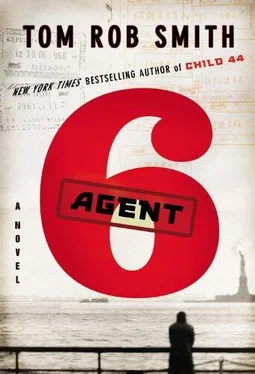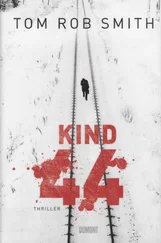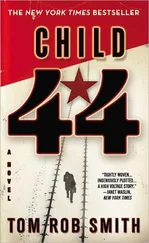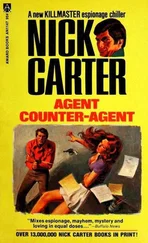Tom Smith - Agent 6
Здесь есть возможность читать онлайн «Tom Smith - Agent 6» весь текст электронной книги совершенно бесплатно (целиком полную версию без сокращений). В некоторых случаях можно слушать аудио, скачать через торрент в формате fb2 и присутствует краткое содержание. Жанр: Триллер, на английском языке. Описание произведения, (предисловие) а так же отзывы посетителей доступны на портале библиотеки ЛибКат.
- Название:Agent 6
- Автор:
- Жанр:
- Год:неизвестен
- ISBN:нет данных
- Рейтинг книги:4 / 5. Голосов: 1
-
Избранное:Добавить в избранное
- Отзывы:
-
Ваша оценка:
- 80
- 1
- 2
- 3
- 4
- 5
Agent 6: краткое содержание, описание и аннотация
Предлагаем к чтению аннотацию, описание, краткое содержание или предисловие (зависит от того, что написал сам автор книги «Agent 6»). Если вы не нашли необходимую информацию о книге — напишите в комментариях, мы постараемся отыскать её.
Agent 6 — читать онлайн бесплатно полную книгу (весь текст) целиком
Ниже представлен текст книги, разбитый по страницам. Система сохранения места последней прочитанной страницы, позволяет с удобством читать онлайн бесплатно книгу «Agent 6», без необходимости каждый раз заново искать на чём Вы остановились. Поставьте закладку, и сможете в любой момент перейти на страницу, на которой закончили чтение.
Интервал:
Закладка:
The captain didn’t wait for Leo to translate. He raised his gun and shot the boy in the head.
Leo stood, hoping that the miracle might be true and that the boy would rise up uninjured and prove that he could not be killed with bullets or bombs and that he truly was protected by a divine power. The boy lay still, sprawled across the beautiful patterned rug, on the stage, with no trace of blood across his bright white shawls. Captain Vashchenko lowered his gun. Distinguished for bravery and courage, this soldier had shot a teenage boy to prove a point – that there was no God, or if there was, then this God was not in the business of intervening in wars. The Afghans had no supernatural force on their side. And they were fighting a force that would do whatever was necessary. All these ideas expressed in a single gunshot.
Leo stepped forward, reaching the stage, bending down and putting a finger on the boy’s neck, feeling the heat of his body. There was no pulse. The captain said:
– We’re done here.
Leo didn’t know this boy. He didn’t know his name or his age. Over the course of seven years in Afghanistan, he’d witnessed atrocities committed by Afghan Communists and by insurrection fighters, by religious fanatics and fanatical Communists – beheadings, murders, executions and firing squads. These deaths would continue no matter what he did or said. The captain would argue, correctly, that boy was old enough to fight, old enough to carry an AK-47, to fire at a convoy, to carry an explosive device. If he hadn’t died here, he might have died in a bombing raid or stepped on a mine. No one needed Leo’s outrage, certainly not the Afghans – they had their own anger. This was a military operation. The captain hadn’t lost his temper, hadn’t been motivated by hatred or sadistic pleasure, he’d weighed up the situation. The boy was an enemy asset, like a stockpile of rifles. His mission had been simple: disprove the miracle. Leo had been too busy worrying over his kiss with Nara to realize the stated objective of their mission had been a front for an assassination. He’d been blind: dulled by opium and a lack of sleep.
Two of the soldiers peered in, seeing the dead boy, checking that the captain was OK. They’d known the nature of their mission. The captain impatiently ushered Leo and Nara to the door.
– We leave, now!
None of the crowd would have been able to see the execution but they would have heard the shot.
Like a statue coming to life one of the elderly men in the hut wailed, a delayed cry of anguish. Startled by the noise, Leo spun round, guessing from the reaction that he was the boy’s father. At the same time, outside the house, the soldiers opened fire with bursts from their machine guns. From his position, still kneeling on the floor with his finger on the boy’s neck, Leo could see the crowd breaking apart, running, several men falling. The captain moved to the entrance, raising his gun, firing shots from the doorway.
In the confusion, Leo neglected to check the old man. The elder had staggered to his feet and was striding towards him with a curved knife, the blade protruding from his hand like a talon. He raised it above his head, ready to strike. Leo’s training and combat instincts deserted him, leaving him helpless before this man’s blade.
The elder’s arm spun away, as though yanked back by a string. The captain fired again, hitting the old man in the shoulder and stomach. The elder dropped the knife. A fourth shot knocked him to the floor, not far from the body of the boy. Leo remained in the same position, still waiting for the knife to hit his neck. The captain turned the gun on the second Afghan elder: a man who’d remained silent, cross-legged on the ground. The captain fired into his chest, killing him, before returning his attention to the fight outside.
Leo slowly got to his feet, sure that he was going to topple, his legs heavy as lead. He felt delirious. Candles flickered, smoke swirled. An explosion outside brought him to his senses. Despite the fact that upon arrival he’d seen no Afghans carrying weapons, they’d evidently produced some. The captain remained in the hut, now on one knee, reloading then firing carefully from the doorway, entirely untroubled by the dead boy behind him.
A burst of machine-gun fire cut through the roof, the line of bullets running along the mud floor. The trapped smoke escaped through the holes, daylight burst through. The villagers were firing from a position on the ridge. The captain returned fire, at the terraced fields, shouting orders at the other soldiers. He darted out, into the open. Another burst of fire came through the roof, hitting the body of the dead elder. Leo made no effort to find safety. Someone grabbed his wrist. It was Nara, pulling him to the back of the house.
They were in the kitchen. There was a mud stove and beside it four women huddled together, a high stack of flat nan bread beside them, ready for the guests visiting the miracle boy. One nan was on the fire, burnt black. The women were too scared to move, letting the bread smoke. Machine-gun fire surrounded them. Leo crouched by the fire, sliding the burnt nan off the stove, regarding the four Afghan women carefully for the first time. One of them wasn’t a woman but a young girl, perhaps only seven or eight years old. The girl’s head was almost totally bald except for the odd clumps of hair twisted by heat. Her scalp was red and raw. There were burn marks on her face, burns to her hands. Slowly Leo began to question the things he’d seen. How could the boy’s hair have been burnt off by the fire without any damage to his skin? Miracles aside, there was no logic to the boyrsquo; s appearance. Leo had encountered many men, women and children who’d survived scenes of devastation and none of them looked like the boy – they looked like this girl. He realized the boy’s hair had been shaved. His appearance had been altered. He’d been dressed to fit the part. If there had only been one survivor, it hadn’t been the boy – it had been this girl. Her place had been substituted for a young man, perhaps someone the villagers hoped would grow into a warrior, or a symbol that could be taken from village to village. They would not have been able to use a girl in that way. The miracle needed to be a boy in order to be a miracle they could exploit. Leo glanced at Nara’s expression. She’d come to the same conclusion.
From outside, the captain called their names. Leo raised a single finger to his lips. By the dim light of the stove Nara gave no response, standing still, her face obscured by the smoke rising from the burnt nan bread. Surely she understood the captain would kill this girl as he had killed the boy. The gender of the child was irrelevant.
The captain shouted out:
– We’re leaving!
Leo moved to the door, gesturing for Nara to follow. She didn’t move, speaking in broken Russian, calling:
– Captain Vashchenko, there is something you need to see.
Not knowing why he’d been called, the captain entered the kitchen cautiously, his gun raised, expecting a trap. Stunned by Nara’s decision and convinced she didn’t understand the consequences of her actions, Leo tried to hurry them out, offering Nara a second chance to save the girl.
– Let’s go.
Leo had underestimated the bond between Nara and the party. She’d chosen the State over him, ignoring his advice, ignoring her own moral code – one that he knew she had. He would not allow her to make the same mistakes he had as an agent. She had made one already, showing no mercy to the deserting couple. But from this there would be no going back; she would be changed, like plastic warped in heat, unable ever to return to its previous shape. The conflicting forces were powerful. She was loyal to the party, loyal to the State. The State was her family now and Leo’s kiss last night had confirmed what she already knew. No Afghan man would ever marry her. She would be alone, hated by her community, protected only by the captain and men like him. Her life depended upon the occupation. If the Soviets lost the war, then she would die with them. Leo’s position, neither a Soviet nor an Afghan, offered her nothing.
Читать дальшеИнтервал:
Закладка:
Похожие книги на «Agent 6»
Представляем Вашему вниманию похожие книги на «Agent 6» списком для выбора. Мы отобрали схожую по названию и смыслу литературу в надежде предоставить читателям больше вариантов отыскать новые, интересные, ещё непрочитанные произведения.
Обсуждение, отзывы о книге «Agent 6» и просто собственные мнения читателей. Оставьте ваши комментарии, напишите, что Вы думаете о произведении, его смысле или главных героях. Укажите что конкретно понравилось, а что нет, и почему Вы так считаете.












